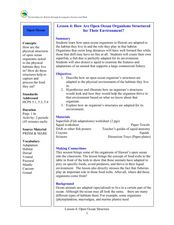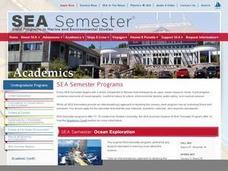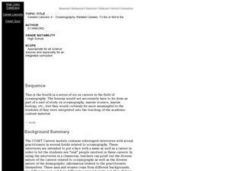Curated OER
Journey of the Pacific Salmon
Students explore oceanography by researching migrating fish. In this Pacific Salmon lesson, students participate in a board game activity in which they move a salmon through their annual journey to the spawning habitat upstream. Students...
Curated OER
What Lives in the Open Ocean and Where Do They Live?
Students explore oceanography by participating in a flash card activity. In this ocean inhabitant lesson, students define a list of ocean related vocabulary terms and answer ocean geography study questions. Students utilize organism...
Curated OER
How Are Open Ocean Organisms Structured for Their Environment?
Young scholars explore biology by conducting an animal dissection. In this oceanography lesson, students identify the life cycle of a squid and other animals that are involved with commercial fishing. Young scholars dissect a squid in...
Curated OER
Under Pressure: How Deep Can They Dive?
Young scholars explore geography by conducting an in-class experiment. In this deep sea exploration lesson, students identify the different zones of the ocean and utilize water bottles, masking tape and scissors to conduct a water...
Curated OER
Hawaii's Freshwater Animals - Species Report
Students explore biology by creating a report for the class. In this oceanography lesson, students research and identify the survival characteristics of a list of freshwater animals by utilizing the Internet and library. Students...
Curated OER
Sampling the Ocean Floor
Young scholars sample goodies from an unseen ocean floor and try to accurately describe their composition. This simulation helps students explain the limitations of sampling and the problem of obtaining representative samples of sea...
Curated OER
Oceanography-Related Careers: To Be or Not to Be. . .
Students investigate various careers in the field of oceanography. They conduct Internet research, record data on a spreadsheet, write a justification to explain why someone should accept a position found online, and write a letter to a...
Curated OER
History and Oceanography
Students identify the accomplishments in oceanography from 17th-19th century, construct a time line with the scientists in chronological order, and discuss the parallels of oceanographic contributions with those in other areas of science...
Curated OER
Oceanography Class Quilt
Students create and observe a collage of oceanography topics that be placed on quilt tiles in a culmination art project to represent information learned.
NOAA
Ocean Acidification
If tap water is more acidic than ocean water, why are we so concerned about ocean acidification? The third installment of a 23-part NOAA Enrichment in Marine sciences and Oceanography (NEMO) program focuses on carbon dioxide levels in...
NOAA
The Biogeochemical Cycle
The biogeochemical cycle ... no physics? The fourth installment of a 23-part NOAA Enrichment in Marine sciences and Oceanography (NEMO) program introduces the biogeochemical cycle by having pupils simulate movement between Earth's...
NOAA
El Niño
El Nino, La Nina ... and the Santa Maria? The 11th installment of a 23-part NOAA Enrichment in Marine sciences and Oceanography (NEMO) program explains the mechanism of El Nino/Southern Oscillation. Pupils use previous data to determine...
NOAA
Technology I
Isn't technology great? The 12th installment of a 23-part NOAA Enrichment in Marine sciences and Oceanography (NEMO) program introduces technology that marine scientists use. Pupils take part in an activity using conductivity,...
NOAA
Sediments
Calcareous ooze ... what an interesting name! The 15th installment of a 23-part NOAA Enrichment in Marine sciences and Oceanography (NEMO) program focuses on sediments found on the ocean floor. After viewing the slideshow lecture,...
NOAA
Plate Tectonics II
Mid-ocean ridges, rift valleys, island arcs, mountain ranges, earthquakes, volcanoes ... there are so many features associated with plate tectonics. The 14th installment of a 23-part NOAA Enrichment in Marine sciences and Oceanography...
NOAA
Coastal Dynamics
Life's a beach! The 16th installment of a 23-part NOAA Enrichment in Marine sciences and Oceanography (NEMO) program first examines different types of coasts and how they form. An activity then has learners investigate the shoreline...
NOAA
Plankton
Dive into the world of plankton. The 17th installment of a 23-part NOAA Enrichment in Marine sciences and Oceanography (NEMO) program introduces different types of plankton. Young scientists then use what they have learned to classify...
NOAA
Marine Policy
Save the oceans! The 22nd installment of a 23-part NOAA Enrichment in Marine sciences and Oceanography (NEMO) program focuses on laws and marine policy. Pupils take part in an activity investigating fisheries stock data.
NOAA
Technology II
Ping, ping, ping. The last installment of a 23-part NOAA Enrichment in Marine sciences and Oceanography (NEMO) program explores technology use in marine studies, such as sonar. Activity involves simulating sonar techniques to identify a...
NOAA
Marine Ecosystems
Be at the top of the food chain when it comes to understanding marine ecosystems. The 21st installment of a 23-part NOAA Enrichment in Marine sciences and Oceanography (NEMO) program investigates marine ecosystems, ocean zones, and food...
NOAA
The Dead Zone
The fifth installment of a 23-part NOAA Enrichment in Marine sciences and Oceanography (NEMO) program defines dead zones and how they form. Pupils then examine data from the Gulf of Mexico to determine dead zone formation.
NOAA
Ocean Layers I
How is it possible for ocean water to have layers? The sixth installment of a 23-part NOAA Enrichment in Marine sciences and Oceanography (NEMO) program investigates factors that cause different water densities to occur. Experiments...
NOAA
Currents
Learn how ocean currents are vital to humans and marine life. The eighth installment of a 23-part NOAA Enrichment in Marine sciences and Oceanography (NEMO) program, focuses on ocean currents and how they affect global climate. The...
NOAA
Ocean Layers II
Now that you know the ocean has layers, let's name them. The seventh installment of a 23-part NOAA Enrichment in Marine sciences and Oceanography (NEMO) program covers terminology associated with ocean layers, such as thermocline and...
Other popular searches
- Oceanography Science
- Oceanography Activities
- Oceanography Vocabulary
- Oceanography Tides
- Introduction to Oceanography
- Oceanography Exploration
- Oceanography Lab
- History of Oceanography
- Careers in Oceanography
- Oceanography Shells
- Geological Oceanography
- Oceanography Careers

























